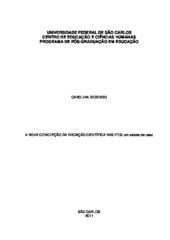| dc.contributor.author | Bedendo, Carolina | |
| dc.date.accessioned | 2016-06-02T19:39:22Z | |
| dc.date.available | 2011-11-18 | |
| dc.date.available | 2016-06-02T19:39:22Z | |
| dc.date.issued | 2011-10-11 | |
| dc.identifier.citation | BEDENDO, Carolina. A nova concepção da iniciação científica nas IFES: um estudo de caso. 2011. 166 f. Dissertação (Mestrado em Ciências Humanas) - Universidade Federal de São Carlos, São Carlos, 2011. | por |
| dc.identifier.uri | https://repositorio.ufscar.br/handle/ufscar/2603 | |
| dc.description.abstract | This paper examines some of the key elements that make up the field of scientific studies on the specificity of initiation of the course of Production Engineering, Federal University of São Carlos (UFSCar), which tend to characterize it as a space where tend is the production of knowledge potentially productive. As proposed objectives for the study, we sought to understand the reasons that lead students to seek the inclusion in the practice of undergraduate research, and understand how knowledge is produced in the research activities of graduate scholars in the field of Production Engineering. In this sense, we seek here to investigate the functionality of the CNPq as a promoter of research through their edicts, in close relationship with the state policy, and the major resolutions that regulate the Institutional Program for Scientific Initiation Scholarships (PIBIC). Then we analyze how its specific UFSCar, objective in their practice the main changes that have been taking shape in higher education as a result of the changing historical rationality imposed their culture through state action.Thus, we draw here an analysis which shows that the construction of knowledge, especially that which is funded within the public university and here in the context of undergraduate research in the field of Production Engineering, aims to produce values for the capital, to increase the intellectual capital of the productive sector and deepen its competitiveness in the face of national and international markets. To this end, the university has changed its historic identity and responds to policies formulated at the national level that allocates Science and Technology (S&T) as the axis of development of the country. In this way, students are realizing their education in pursuit of a certain social prestige that research can give them, according to testimonies collected in interviews in order to turn their expectations in achieving a place in graduate school or in a prominent place in labor market, as a reward for intensified work in the dynamics of research | eng |
| dc.format | application/pdf | por |
| dc.language | por | por |
| dc.publisher | Universidade Federal de São Carlos | por |
| dc.rights | Acesso Aberto | por |
| dc.subject | Educação | por |
| dc.subject | Ensino superior | por |
| dc.subject | Iniciação científica | por |
| dc.subject | Formação humana | por |
| dc.subject | Educação superior | por |
| dc.subject | Iniciação científica | por |
| dc.subject | Formação humana | por |
| dc.subject | Higher education | eng |
| dc.subject | Scientific initiative | eng |
| dc.subject | Human development | eng |
| dc.title | A nova concepção da iniciação científica nas IFES: um estudo de caso | por |
| dc.type | Dissertação | por |
| dc.contributor.advisor1 | Silva Junior, João dos Reis | |
| dc.contributor.advisor1Lattes | http://lattes.cnpq.br/7470123176068422 | por |
| dc.description.resumo | Este trabalho analisa alguns dos principais elementos que compõem o campo de estudos da iniciação científica na especificidade do curso de Engenharia de Produção da Universidade Federal de São Carlos (UFSCar) e que tendem a caracterizá-lo como um espaço onde tendencialmente ocorre a produção de um conhecimento potencialmente produtivo. Como objetivos propostos para estudo, buscamos compreender os motivos que levam os alunos a buscarem a inserção na prática da iniciação científica, bem como entender de que forma o conhecimento é produzido nas atividades de pesquisa dos graduandos bolsistas no campo da Engenharia de Produção. Neste sentido, buscamos aqui investigar a funcionalidade do CNPq como agente indutor de pesquisas por meio dos seus editais, em estreita relação com a política do Estado, e as principais resoluções que normatizam o Programa Institucional de Bolsas de Iniciação Científica (PIBIC). Em seguida, analisamos como a UFSCar na sua especificidade, objetiva em suas práticas as principais mudanças que vêm se concretizando na educação superior como decorrência da mudança da racionalidade histórica imposta em sua cultura por meio da ação estatal. Dessa maneira, traçamos aqui uma análise que aponta que a construção do conhecimento, especialmente aquela que é financiada no interior da universidade pública e aqui, no contexto da iniciação científica no campo da Engenharia de Produção, visa a produção de valores para o capital, no sentido de aumentar o capital intelectual do setor produtivo e adensar a sua competitividade frente aos mercados nacionais e internacionais. Para tanto, a universidade tem sua identidade histórica alterada e atende às políticas formuladas em âmbito nacional que define a Ciência e a Tecnologia (C&T) como o eixo central do desenvolvimento do país. Nessa direção, os alunos vêm concretizando sua formação na busca de determinado prestígio social que a pesquisa pode lhes conferir, conforme depoimentos recolhidos em entrevistas, de forma a voltarem suas expectativas para o alcance de uma vaga na pós-graduação ou de um lugar de destaque no mercado de trabalho, | por |
| dc.publisher.country | BR | por |
| dc.publisher.initials | UFSCar | por |
| dc.publisher.program | Programa de Pós-Graduação em Educação - PPGE | por |
| dc.subject.cnpq | CIENCIAS HUMANAS::EDUCACAO | por |
| dc.contributor.authorlattes | http://lattes.cnpq.br/5435171041429895 | por |
